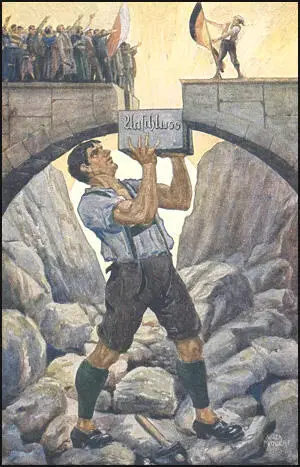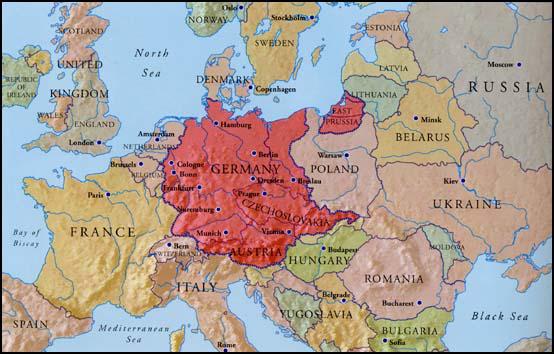Anschluss
After the collapse of the Austro-Hungarian Empire at the end of the First World War, the majority of the German speaking people in Austria wanted to unite with the new German Republic. However, this was forbidden by the terms of the Treaty of Versailles.

Demands for the union (Anschluss) of Austria and Germany increased after Adolf Hitler became German Chancellor. In February, 1938, Hitler invited Kurt von Schuschnigg, the Austrian Chancellor, to meet him at the Berghof. Hitler demanded concessions for the Austrian Nazi Party. Schuschnigg refused and after resigning was replaced by Arthur Seyss-Inquart, the leader of the Austrian Nazi Party. On 13th March, Seyss-Inquart invited the German Army to occupy Austria and proclaimed union with Germany.
Austria was now renamed Ostmark and was placed under the leadership of Arthur Seyss-Inquart. The Austrian born Ernst Kaltenbrunner was named Minister of State and head of the Schutz Staffeinel (SS).

Primary Sources
(1) Kurt von Schuschnigg, radio broadcast (11th March, 1938)
This day has placed us in a tragic and decisive situation. I have to give my Austrian fellow countrymen the details of the events of today.
The German Government today handed to President Miklas an ultimatum, with a time limit, ordering him to nominate as chancellor a person designated by the German Government and to appoint members of a cabinet on the orders of the German Government; otherwise German troops would invade Austria.
I declare before the world that the reports launched in Germany concerning disorders by the workers, the shedding of streams of blood, and the creation of a situation beyond the control of the Austrian Government are lies from A to Z. President Miklas has asked me to tell the people of Austria that we have yielded to force since we are not prepared even in this terrible situation to shed blood. We have decided to order the troops to offer no resistance.
So I take leave of the Austrian people with the German word of farewell uttered from the depth of my heart: God protect Austria.
(2) The Manchester Guardian (14th March, 1938)
On the day on which she was to have voted on her freedom and independence, Austria was last night officially proclaimed a "State of the German Reich." The Anschluss has been brought into being. A month hence the Austrian people will be asked to say what they think of it.
The law - enacted by the Austrian government and "accepted" by the German - states:
On the basis of the Federal Constitution law regarding the extraordinary measures within the scope of the Constitution, the Federal Government has resolved;
1. Austria is a state of the German Reich.
2. On Sunday, April 10, a free and secret plebiscite of the German men and women of Austria over twenty years of age will take place regarding the reunion with the German Reich.
It is explained in Berlin that Austria now becomes a Federal State of the Reich, such as Bavaria, Saxony and Württemberberg. Austria, like Bavaria, will retain her own Government, and for the present the existing laws will remain in force.
Herr Hitler has incorporated the Austrian Army in the German Army and placed it under his command.
Last night it was announced that President Miklas had resigned at the request of Dr. Seyss-Inquart, the Nazi Chancellor, who took over the President's powers.
In all countries-except Italy and Japan, partners with Germany in the anti-Comintern Pact, the annexing of Austria is condemned.
(3) Adolf Hitler, speech at Koenigsberg (25th March, 1938)
Certain foreign newspapers have said that we fell on Austria with brutal methods. I can only say; even in death they cannot stop lying. I have in the course of my political struggle won much love from my people, but when I crossed the former frontier (into Austria) there met me such a stream of love as I have never experienced. Not as tyrants have we come, but as liberators.

